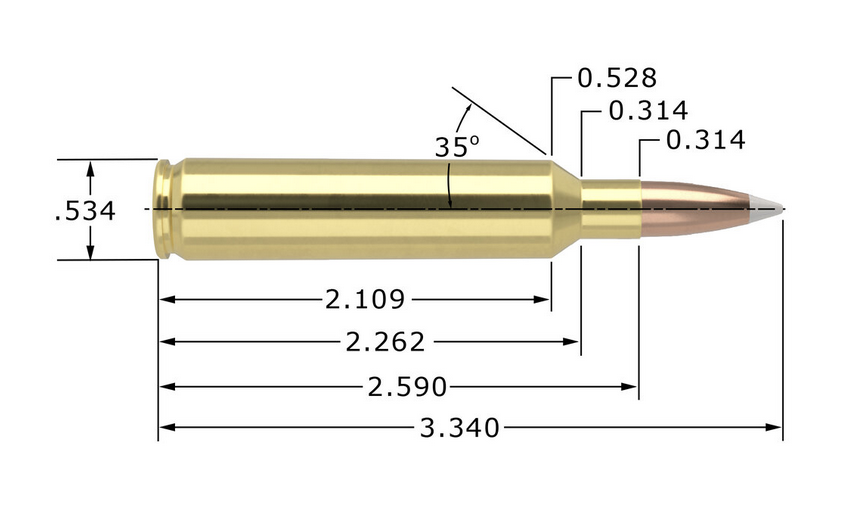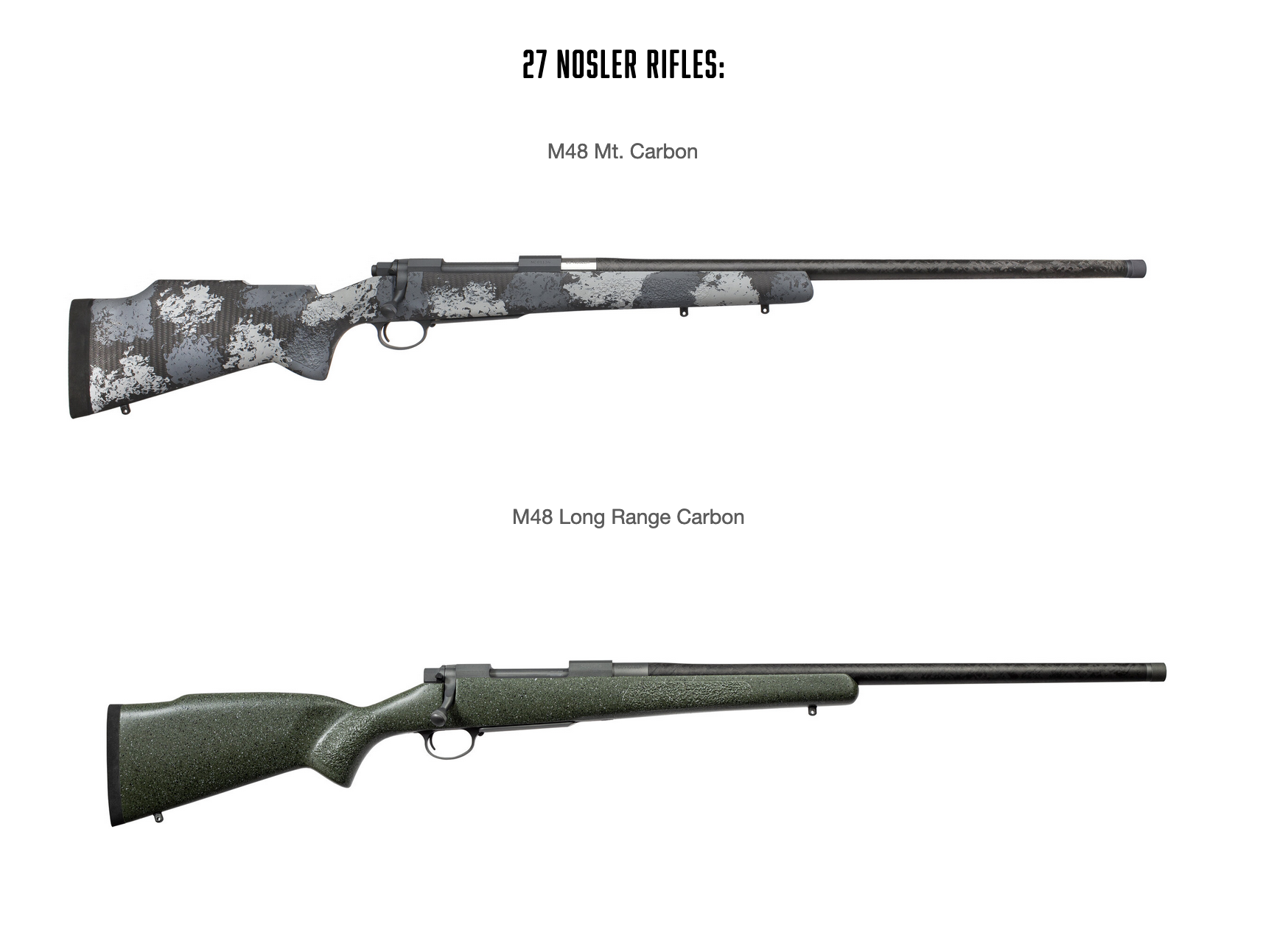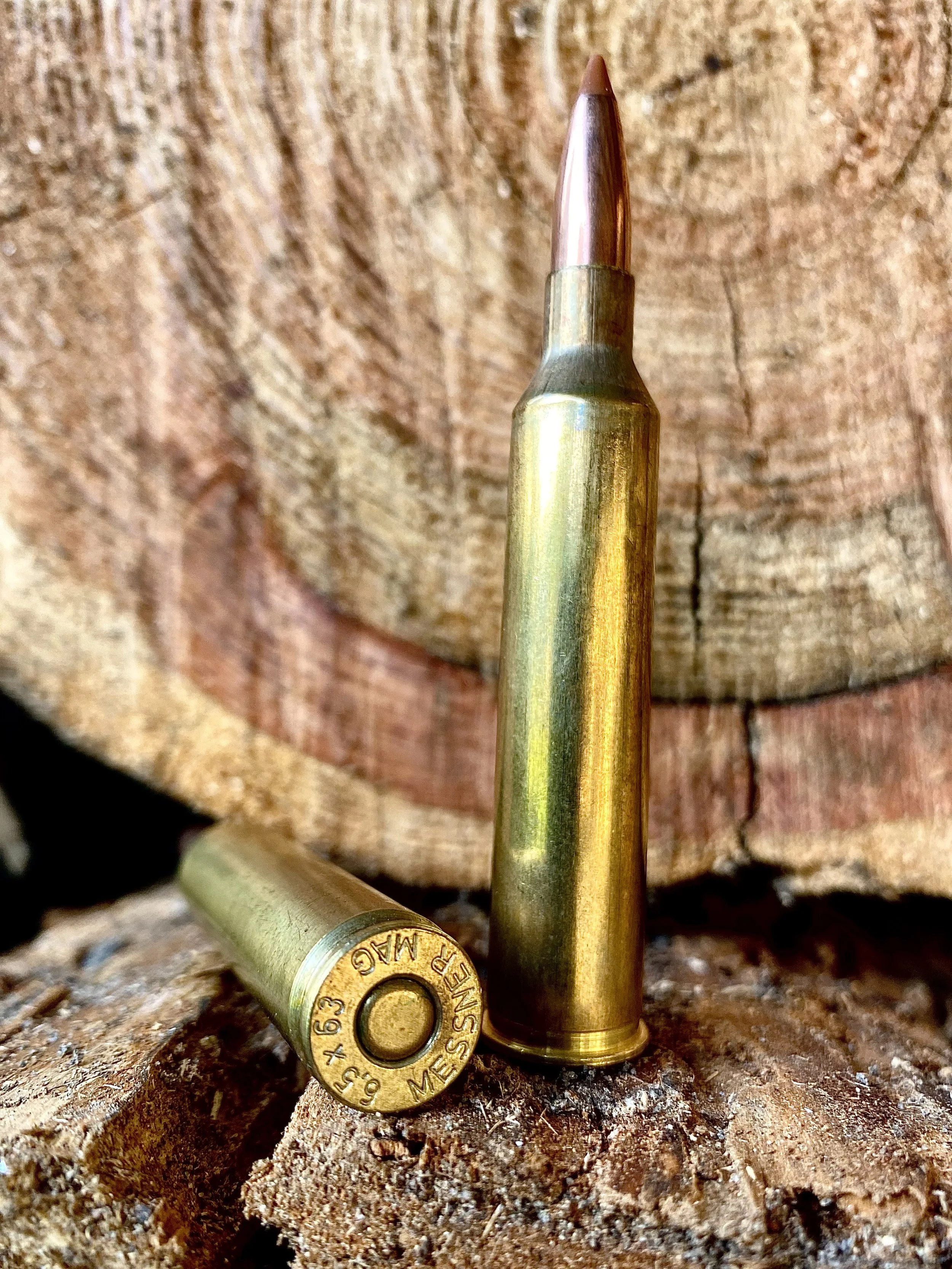New 270 Cartridges Challenge 6.5s and 7mms
After years of 6.5mm mania, 270 cartridges are mounting a challenge, matching or outperforming even some 7mm magnums.
Stated another way, it’s the 270’s turn. And we don’t mean the old 270 Winchester (although that's still a viable option and better than ever.) No, we mean the .277 Sig Fury, 27 Nosler, and 6.8 Western, the three newest 270s joining this growing family of hunting cartridges that already includes the 270 Winchester, 270 Weatherby Magnum, 270 Winchester Short Magnum, and the little 6.8 Remington SPC.
Nosler Gives 270 Cartridges a Magnum Boost
Image shows 27 Nosler cartridge with dimensions.
The 27 Nosler is essentially the 26 Nosler necked up or 28 Nosler necked down with just enough differences in neck length or case length to prevent accidental chambering in the wrong rifle. These Nosler cases -- based on the fat, 404 Jeffery -- fit standard-length (30-06) magazines/actions. Nosler chambers its M48 bolt-action rifles in 27 Nosler.
Nosler has introduced the 27 Nosler, a 27-caliber cartridge based on the 404 Jeffery case, same as the 30, 28, and 26 Noslers. Although not titled a "magnum," it bests all other 270 cartridges by throwing a 150-grain bullet 3,300 fps from a 26” barrel. That's 300 to 400 fps faster than the 270 Winchester. It’s 200 fps faster than the 270 WSSM and 100 fps quicker than the 270 Weatherby Magnum. That means the 27 Nosler delivers more energy downrange, drops less , and deflects less in crosswinds. But at the cost of more recoil. Figure on absorbing about 30 to 34 foot-pounds of recoil in an 8-pound rifle. A 270 Winchester would generate only 20 f-p in the same rifle.
The 270 cartridges family gains traction with Nosler's M48 rifles chambered for the fastest 270 on the market, the 27 Nosler. Action length is the same as the old 270 Winchester.
Equally significant is the 27 Nosler’s recommended twist rate: 1 turn in 8.5 inches. Why so fast? To stabilize new, long, high B.C. bullets like the 165-grain AccuBond Long Range (B.C. .62,) the 170-grain Berger EOL Elite Hunter (G1 B.C. .662,) and Sierra’s 175-grain TGK. Hunters don’t always need such long, heavy bullets, but those high B.C. bullets minimize wind deflection and maximize retained energy at long range. (Or you can just stalk closer and to heck with pushing the envelop.)
With its case capacity (98.4 grains water compared to about 80 grains in a 270 Wby. Mag.,) the 27 Nosler should be able to nudge a 165-grain along at 3,150 fps, perhaps 3,200 fps, making this the fastest 270 cartridge in the world unless…
Unless Sig Sauer’s new 277 SIG Fury beats it.
277 SIG Fury Unique Among 270 Cartridges
The new Sig round is wildly different because it’s been chronographed spitting 140-grain .277 bullets 3,000 fps — from a 16-inch barrel. Figure another 30 fps velocity increase for every inch of barrel added and a 24-inch launchpad could nudged that 140-grain to 3,240 fps. Clearly that won’t touch the 27 Nosler, but that’s not surprising because the 277 SIG Fury case is the same length and diameter as the 308 Winchester. Yes, this is a short-action, small-capacity case which demands we ask the obvious question: how is it shooting as fast from a 16-inch barrel as the larger 270 Winchester shoots from a 24-inch barrel?
The answer is higher allowed chamber pressure. Super pressure. The 270 Winchester’s SAAMI spec maximum chamber pressure is 65,000 psi. The SIG Furry’s is 80,000 psi. To contain those pressures, the SIG cartridge is built with a stainless steel head. The main body, however, is brass. This gives it the necessary elasticity to expand and seal the chamber while the stronger steel head keeps the back end from rupturing.
Special Cartridge Construction Required For 277 Fury
The pieces of the 277 Furry case are assembled via an internal pressure ring of some kind near the base. I’m not exactly sure how it’s accomplished, but it involves plenty of pressure, I’m sure. The included photo of a model/mock up is close but not exact. In real life a lip of the brass wall gets rolled and pinched under the steel, I've been told.
Image shows a large model of a 277 SIG Fury cartridge cutaway showing hybrid brass/steel case.
This large cutaway model of the 277 SIG Fury cartridge isn't exact, but approximates the construction of the brass-to-steel case. The stronger steel base contains 80,000 psi chamber pressures while the brass body and neck expand, as all brass cartridges do, to seal gases, then quickly cool and contract to permit extraction. Reloading of spent brass reportedly is possible.
To contain these 80,000 psi chamber pressures SIG has built a beefy rifle to contain 277 SIG Fury pressures. The SIG Cross Rifle is a bolt action looking quite a bit like an AR-15. In other words, ugly. Hey, I’m sorry if I offend your sensibilities, but beauty is in the eye of the beholder and my eye has never beheld beauty in any rifle built with hard angles, holes, posts, adjustable combs and butts, etc. Such tools may be infinitely adjustable for precision fit and performance, but I’ll walk the woods and get my game with a more classic looking hunting rifle, thank you. Yes, this indicates I’m a fudd and possibly in the minority. The shape and look of the SIG Cross seems to be the popular style these days.
The skeletal appearance of the SIG Cross Rifle makes it appear to be an auto-loading, AR-15 style at first glance, but look closely and you'll see the bolt handle. LOP and comb height are fully adjustable for precise fit. The entire butt hinges forward to reduce rifle length during transport and storage. The receiver is extra strong to contain the 80,000 psi pressures the 277 SIG Fury cartridge generates. This military esthetic seems to be the new face of firearms.
Switch Barrel System
Not only is the Cross rifle precise, tight, remarkably adjustable for fit, and impressively light at just 6.5 pounds, but it’s also a switch barrel. Users can remove the shroud around the floating barrel, loosen a locking nut, pull off the barrel, and mount a new barrel in the same or different chambering. This puts a whole new spin on replacing shot-out barrels. The rifling twist of the 277 Fury Cross is 1:8.5, so it will stabilize most, if not all the new heavy, long, high B.C. .277 bullets. Barrels are set up to accept suppressors, a good idea considering the muzzle blast from a 16-inch barrel. SIG really thought this one out. They’re bringing the 27-caliber into the 21st century the way the 270 Winchester brought it into the 20th.
277 Fury cartridge sports a stainless steel head to contain its 80,000 psi chamber pressures.
Military Incentive Behind SIG 277 Fury
While the 27 Nosler was a natural evolution of Nosler's other 404 Jeffery-based cartridges for big game hunting, the 277 SIG Fury arose out of SIG's project to build a light, belt-fed .277 machine gun cartridge and rifle for the U.S. military. Testing for that is still underway, but the civilian bolt-action rifle and ammo should be on dealer shelves.
Both the 27 Nosler and 277 SIG Fury are proprietary, so you’ll have to buy a Noser M48 rifle to get the 27 Nosler or a SIG Cross to get the 277 Fury. If neither of these rifles lights your fire, you might want to consider the 6.8 Western, the world’s newest 270 from Winchester and Browning.
6.8 Western Is A 270
The 6.8 Western (center) is the 270 WSM slightly shortened. Both throw .277” bullets and out-shoot the original 270 Winchester (left.)
Yes, in an industry gone mad for metric, 6.8mm is the equivalent (roughly) of 27-caliber. I imagine Winchester and Browning, which jointly developed the 6.8 Western, gave it that moniker to prevent confusion with the similar 270 WSM. About all they did was push the shoulder of the 270 WSM back about .081” to make the 6.8 Western. Same bullets. Nearly the same powder capacity. So why bother? Faster twist rate to stabilize heavier, higher B.C. bullets. Why didn’t they just build some fast twist 270 WSM rifles? Too confusing. Owners of standard twists might buy ammo with bullet too long to stabilize.
Long, high B.C. bullets are the solid trend and the 6.8 Western is Winchester’s entry into the long range 270 sweepstakes. On paper it works, providing more downrange energy and a wider bullet (wound channel) than the 6.5s, matching or bettering the ballistics and energy of the 7mm Rem. Mag. and all slower 7mms.
With these three new cartridges coming on line, our 270 selection has just grown from four members to seven: 6.8mm Remington SPC, 270 Winchester, 270 WSM, and 270 Wby. Mag., 27 Nosler, 277 SIG Fury, and 6.8 Western. Will this be the start of a new fashion to beat the 6.5mms and 7mms at their own game? Time will tell. The .277-inch bullets between 130- and 175-grains are certainly in the ball park for the right balance of mass, B.C., velocity, and retained energy with tolerable recoil for the hunting of most antlered game.
Continuing What The 270 Winchester Started
None of these developments means the 270 Winchester is being put to pasture. The original 270 set the benchmark for 27-caliber performance starting way back in 1925. It has since proven remarkably effective for deer, but surprisingly deadly on elk, moose, and even brown bears with the right bullets. And today's bullets are more right than ever. Combine todays’ best controlled expansion bullets with new, efficient powders and the old 270 rides again. Put those bullets atop the new, faster, more powerful 270 cartridges and we may indeed witness the old 270 rising.
Ron Spomer got his first 270 Winchester in 1976, trading up from a little 6mm Remington in preparation for his first Montana elk hunt. He's not convinced he needs one of the new 270s, but he's willing to keep an open mind.











